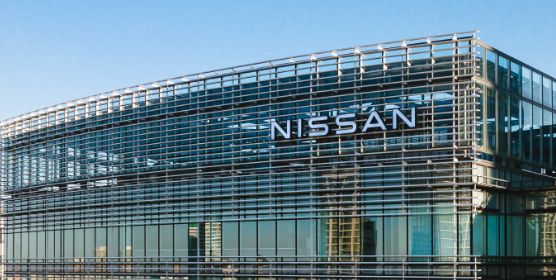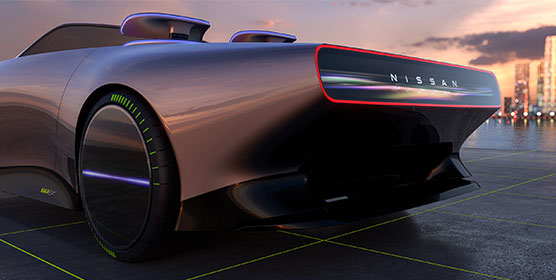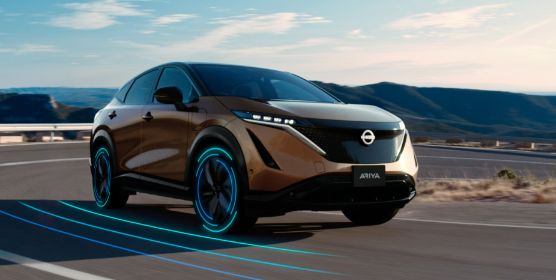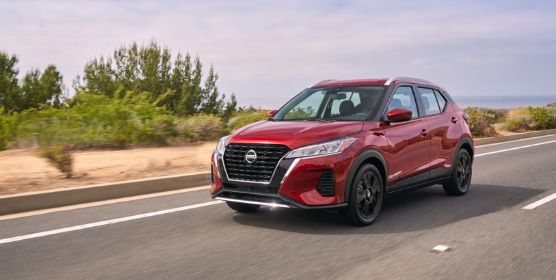Nissan’s Environmental Initiatives
Environmental Principles
Nissan's Environmental Philosophy: A Symbiosis of People, Vehicles, and Nature
In addition to deepening our understanding of the environment, we conduct all of our operations, including production and sales, with consideration for people, society, nature and the earth, as a means of contributing to the building of a better society.
Ultimate Goal
We will manage the environmental impact caused by our operations and products to a level that can be absorbed by nature and pass on rich natural capital to future generations.
What We Want to Be: A Sincere Eco-Innovator
Sincere:
Proactively
address
environmental
challenges
and
reduce
our
impact
on
the
environment.
Eco-Innovator:
Develop
a
sustainable
mobility
society
through
innovative
technology
in
products
and
services.

To realize the promise of its environmental philosophy “a Symbiosis of People, Vehicles and Nature,” Nissan has promoted a series of midterm environmental action plans under the name “Nissan Green Program (NGP).” Under NGP2016, our previous plan, the company continued taking steps toward its ultimate goal of reducing environmental dependence and impact to levels that nature can absorb. The targets set for four key initiatives under the program, “Zero-emission vehicle penetration”, “Fuel-efficient vehicle expansion”, “Corporate carbon footprint minimization”, and “Natural resource use minimization” were fully achieved.
Environmental Initiative and Framework
With the world population expected to reach 9 billion by 2050, communities and the business sector will play growing roles in solving social issues and working to realize the Sustainable Development Goals (SDGs) adopted by the United Nations. The automobile industry, too, faces an increasingly important responsibility to provide value to society by delivering safe, secure and sustainable mobility for all.

Nissan supports the Sustainable Development Goals.
Nissan's Strategic Approach to Environmental Issues
To
solidly
contribute
to
global
environmental
issues,
Nissan
engages
in
direct
discussions
with
environmental
experts,
investors,
NGOs,
NPOs
and
other
organizations
throughout
the
world
and
identifies,
we
analyze
opportunities
and
risks
facing
the
Company
and
decide
on
material
issues*1
recognized
as
important
by
both
stakeholders
and
Nissan,
contributing
to
the
formulation
of
Nissan’s
medium-
and
longterm
environmental
strategies.
Nissan
is
conducting
analyses
using
the
Corporate
Ecosystem
Services
Review
method,
which
considers
the
dependence
and
impact
of
its
activities
on
ecosystems
service.
This
evaluation
covers
the
entire
value
chain,
from
material
resource
extraction
to
vehicle
production
and
vehicle
operation,
with
the
aim
of
identifying
material
issues
related
to
the
environment.
Nissan
has
identified
climate
change,
resource
dependency,
and
water/air
quality
as
important
areas
to
address
in
its
medium
to
long-term
environmental
strategy.
Specific
action
plans
have
been
set
until
2030
to
tackle
these
issues.
- Click here for more information on the Nissan's materiality including environmental issues.
A Holistic Approach to Material Environmental Issues

NGP2030: A Further Evolution
The NGP2030 reinforces Ambition 2030, the company's long-term vision, and sets out the steps required to achieve progress in lofty sustainability ambitions. As a mobility solutions provider, Nissan understands the significant responsibility it has for the environment – and the scale of the positive contribution we can make.
Activities in NGP2030
Environmental governance
Corporations today are expected to disclose on environmental initiatives and related decision-making in a reliable and transparent manner.
Nissan issues its Sustainability Report each year including detailed information from scorecards, which serve as tools for monitoring its progress on environmental initiatives and a materiality assessment for identifying priority issues. The company also communicates with a broad range of stakeholders through other means, including responses to inquiries from environmental rating agencies.
To carry out comprehensive environmental management as a global company while responding to a diversifying range of environmental challenges, Nissan has established an organizational approach linking its various functions and regions. The Global Environmental Management Committee (G-EMC), co-chaired by a board member, determines overall policies and the content of reports put before the Board of Directors. Its meetings are attended by corporate officers chosen based on the issues to be discussed. Executives also clarify the risks and opportunities before the company and assign specific actions to each division, as well as managing and operating environmental programs efficiently based on the PDCA (plan, do, check, act) cycle.
Nissan continues to promote solid governance through its Global and Regional Environmental Management Committees (G-EMC and Regional EMCs). Executives meet regularly to discuss the progress of action plans under NGP2030, as well as emerging material risks, and corporate opportunities that should be implemented in the future plans.
Environmental management organization




























